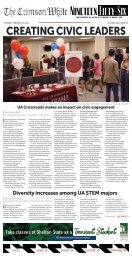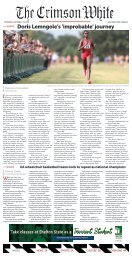You also want an ePaper? Increase the reach of your titles
YUMPU automatically turns print PDFs into web optimized ePapers that Google loves.
American culture is saturated with<br />
underdog stories. Classic tales and<br />
epic films depict legendary quests in<br />
which the unfavored character overcomes<br />
the odds that the world has<br />
stacked against them. Obstacle after<br />
obstacle presents itself, convincing audiences<br />
that there is simply no way that<br />
the unlikely hero can manage to prevail.<br />
Nevertheless, just when all hope seems<br />
lost, something shifts. Every plot element<br />
lines up just right, and once again<br />
the viewers find themselves captivated<br />
as the new champion rises. At this point,<br />
the script practically writes itself. There<br />
is just something within human nature<br />
that roots for the one that everyone else<br />
underestimates. Perhaps America sings<br />
the song of the unsung hero because she<br />
herself is one of them, a nation whose<br />
glory has been maintained through the<br />
aid of some fellow scrappy underdogs<br />
who chose to make their own history<br />
when everyone else told them that<br />
it would probably be better if they just<br />
stayed home.<br />
The year 2018 marks the 70th anniversary<br />
of President Harry S. Truman’s<br />
signing of the Women’s Armed Service<br />
Integration Act following the stellar performance<br />
of military women in World<br />
War II. For the first time, the female<br />
presence in the U.S. military was federally<br />
integrated and secured. But even before<br />
the lyrics of The Star Spangled Banner<br />
were scripted or the stars and stripes<br />
of the flag itself were stitched, women<br />
have played a significant role in the nation’s<br />
war efforts.<br />
According to the U.S. Army historical<br />
database, this role spans all the way<br />
back to the Revolutionary War. While<br />
many women volunteered to serve as<br />
nurses, seamstresses and cooks, others<br />
braved the frontlines. Margaret Corbin<br />
traded in more traditional roles to combat<br />
the British-Hessian attack on Fort<br />
Washington alongside her husband in<br />
<strong>No</strong>vember of 1776. When he was tragically<br />
killed, Corbin left her station manning<br />
the cannon ammunition to fill his<br />
position on the artillery firing squad.<br />
She was wounded in battle and went on<br />
to receive the pension that her husband<br />
would have earned for his service. The<br />
Continental Congress honored her as the<br />
first servicewoman in the Army.<br />
What a woman.<br />
From working undercover as spies<br />
during the Civil War to braving the necessary<br />
steps to achieve the official integration<br />
of women into the U.S. Army<br />
in the late 1970s, females have proved<br />
themselves, against all odds, a force to be<br />
reckoned with. This force lead to monumental<br />
societal change. Army records<br />
credit the more than 25,000 women<br />
serving in the World War I Army Nurse<br />
Corps and other positions overseas for<br />
their influence to “propel the passage of<br />
the 19th Amendment” that extended the<br />
right to vote to women. These displays<br />
of true grit and patriotism replay themselves<br />
over and over again in the context<br />
of each American war. Yet it wasn’t until<br />
2013, only five years ago, when Secretary<br />
of Defense Leon Panetta declared an end<br />
to the direct ground combat exclusion<br />
rule that finally opened up all combat<br />
positions to women:<br />
“Over the last decade of war, women<br />
have proven themselves to be critical to<br />
our success in theater. This change will<br />
give the Army access to the untapped<br />
potential that our women warriors have<br />
to offer…” Panetta said in a directive<br />
lifting the ban on women in front-line<br />
combat roles.<br />
The bill’s recognition of women’s<br />
excellent service through the limited<br />
timeline of “the last decade” is quite<br />
the understatement. However, the offi-<br />
64 <strong>Alice</strong> Spring 2018


















